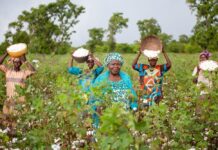The latest policy discussion document published by South Africa’s ruling party, the African National Congress (ANC) presents a positive change from the ambiguous agriculture policy.
According to Wandile Sihlobo, a senior fellow in the Department of Agricultural Economics at the Stellenbosch University in South Africa, the document talks to the primary issues that, if implemented relentlessly, would drive the sector’s growth in ways that would benefit all.
The policy document is set for debate at the ANC’s policy conference in July, which is a precursor the party’s elective conference scheduled for December this year.
“The previous policy documents were clouded by the proposals to amend the constitution to allow for expropriation of land without compensation under specific circumstances,” Sihlobo said.
“Beyond the push for radical land reform, there was inadequate reflection on the drivers of growth in the agricultural economy, and the importance of food security. The recently released document has a sharp focus on the key interventions to drive the agricultural and rural economy. It highlights the sector’s role in job creation and reducing poverty.”
He applauded the ANC for acknowledging that: Agriculture remains an important sector of the South African economy. It holds the potential to uplift many poor South Africans out of poverty through increased food production, vibrant economic activity, and job creation.”
He added that the policy discussion document draws from the insights of a 2018 collection of studies which found that, on average, growth in agriculture is more poverty-reducing than an equivalent amount of growth outside agriculture.
“This brings home the need to invest and expand agricultural production. That is if South Africa is to reduce poverty, raise its economic growth rate and the rate of development, specifically in the rural communities.
Overall, my assessment is that the idea presented by these discussion papers on agriculture, land reform and rural development are sound. They also speak to the core issues that have held back the growth of agriculture in South Africa,” he said.
“That said, once these ideas have been adopted as the governing party’s policy positions, they still need to be translated into government policy. There’s a risk they may be diluted along the way. A lot also will depend on how well the government is able to implement the proposals.
“The ANC acknowledges that the growth of the agricultural sector partly depends on effective land reform which includes bringing into production underutilised land. Such land is mainly in the state owned farmlands and the former homelands in the provinces of the Eastern Cape, KwaZulu-Natal and Limpopo. The weak land governance, infrastructure and institutions n these areas are amongst the key constraints to agricultural progress.”
The academic said the ANC should now place emphasis on the Land Reform and Agricultural Development Agency, first announced by President Cyril Ramaphosa in 2020 and more recently in the State of the Nation address in 2022.
“The agency would ideally focus on the redistribution pillar of the land reform programme. The other pillars are land restitution and tenure. The agency would bring about national coordination, reduce red tape, and become a one-stop shop for issues related to a decentralised redistribution of agricultural land.
“The ANC policy papers also emphasise the need to improve the functioning of municipality and the network industries – road, rail, water, electricity and ports. These are issues I have emphasised several times. ed Some of the challenges the sector has faced in the recent past stem from the poor functioning of network industries and the failure of the municipalities.”









